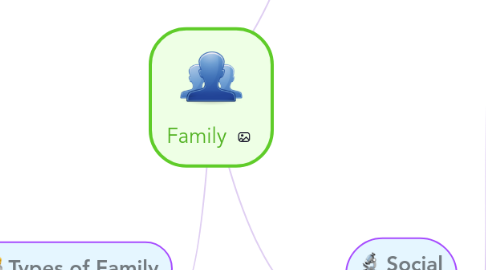
1. Functions of the Family
1.1. Economic Functions
1.1.1. Meeting the needs of its members
1.1.2. Creates social security for individuals and the community as a whole
1.1.3. Creates and educates healthy workers that will one day join the work force, helping the continuation of the evolving economy
1.2. Psychological Functions
1.2.1. provides socialization for children, teaching them early interaction skills
1.2.2. Provides affection/ acceptance for individuals through the relationships formed
1.2.3. Provides mental and relationship necessities for its members
2. Types of Family
2.1. Nuclear Family - one or two parents, regardless of gender, plus their unmarried children, living together.
2.2. Reconstituted, or blended, family - parents who have remarried and are living together with children from previous relationships.
2.3. Extended family - parents, regardless of gender, and their unmarried children living together with other relatives, such as grandparents.
2.4. Consanguineal family - Usually a mother, her children, and extended family members. This family form is useful for mothers who do not have the resources to raise their children on their own.
2.5. Common-law family - An unmarried couple, regardless of gender, with or without children.
3. Social Sciences
3.1. Anthropology - The study of human culture from a historic approach. We use it to look at how the family works from a cultural standpoint, and how an evolving culture influences the family and its structure.
3.1.1. Functionalism - A theory that states the expected consequences, manifest functions, unintended consequences, and latent functions, impact the functioning of society. Eg, how the family system affects society and culture
3.1.2. Cultural Materialism - The theory states that the physical materials, conditions and economic activity within an environment determine how the ideas and ideology of a culture develop. Looking a the family, we use this theory to see how the family develops with the introduction of new technology
3.2. Sociology - The study of individuals in groupings and how they are affected by, and themselves effect society. We use it for family studies to view how the family structure works and how families interact with the environment and society around them.
3.2.1. Marxism/ Conflict Theory - the theory that states that production is essential for the advancement of society. Associated with the creation of goods there will be, eventually, a few individuals that will control the majority of the resources and their means of production. Would be used to look at the social status of families and what makes them successful/ unsuccessful.
3.2.2. Systems Theory - Examines how groups of individuals interact as a system, a set of different parts that work together and influence one another in a relatively stable way over time. Family systems theory applies to the examination of family processes. A basic concept is that family systems have a complex organization.
3.2.3. Feminism - The Feminist ideology offers another unique interpretation of society. Would be used to study the woman's role in the family
3.3. Psychology - The study of how individuals or groups think and the mental process of those individuals and groups.
3.3.1. Symbolic Interactionism - This theory looks at how individuals behave based on their perceptions of themselves and others. People (1) experience the world, (2) define and interpret their experiences and (3) give those experiences meaning. This theory is used to determine how individuals interact with one another and form relationships based on their previous experiences.
3.3.2. ExchangeTheory - Looks at how individuals make choices within roles by weighing costs and benefits. Its is used to see how/ why individuals form the relationships that they do
3.3.3. Developmental Theory - The theory states that certain stages in an individual’s life there are tasks (milestones) that must be met in order to have a healthy development. Would be used to look at how individuals form relationships and the choices they make when starting and providing for a family.
